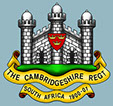
Who Were
The Cambs
The Cambs
at War
1/1st Btn 1914-1919
1914 - 1/1st Overview
1915 - 1/1st Overview
1915 - St Eloi
1915 - Fosse Wood
1916 - 1/1st Overview
1916 - The Schwaben
1916 - St Pierre Divion
1917 - 1/1st Overview
1917 - St Julien
Insignia, Medals & Books
Remembering The Cambs
Biographies
About Us &
This Site
The Cambridgeshires & the German Spring Offensive - 21st to 30th March 1918. Part 2
27th & 28th March
At 6am on March 27th the enemy attacked along the whole line but was beaten off before the 118th Brigade began to withdraw once again. However, the Germans were again threatening to attack in the rear of their left flank, but these attacks were beaten off.
Major Harry Few, of Willingham, recalled: Soon after daylight on the 27th March, we found the Germans had crossed the Somme and had begun to outflank us.
He added: I believe it was later on the same day that two companies commanded by Wright (Lt Herman Wright) and Lacey (Lt John Le Grice Lacey) were cut off. The Germans passed over them. Later a counter attack by another brigade released them and commandeered them for a few days.
By midnight, the Germans had cut British communications to Lamotte and were on three sides of them. Orders came through that the line was to be held to the last man and any further withdrawal cancelled.
However, by 4am orders were given to withdraw via Harbonnieres to Caix and north-west to Ignaucourt, with 118th Brigade covering the withdrawal of 117th Brigade.
By 7am the Germans saw what was happening and put down a heavy barrage. The two brigades, now very short of men, were reorganised into two battalions, one under Major Few. They were again ordered to counter attack but their advance was met by German machine gun fire from Hill 90, near Cayeux. The attackers, about 150 men, worked forward and sustained many casualties before driving back the Germans into a copse.
It was here that CSM Harry Betts DCM, from March, charged some machine guns and captured 20 prisoners. He was awarded a Bar to his DCM.
His citation read: For conspicuous gallantry and devotion to duty. During ten days’ very hard fighting this warrant officer, who had taken over the duties of regimental sergeant-major early in the operations, showed an impressive example of courage and coolness under heavy fire on all occasions. On one occasion the battalion, which had been very much reduced in numbers, both of officers and men, delivered a successful counter-attack, driving back the enemy a considerable distance and capturing men and machine guns. Company Sergeant-Major Betts was conspicuous for the fearless manner in which he attacked the machine gun positions, and his behaviour had a marked effect on the men.
After facing more attacks, the Cambs Regt had to withdraw again to the rear and were reorganised again, but had reached the limit of their endurance. Clayton wrote that those who took part in the fighting on March 28th declared that it was the longest day they had every experienced.
Major Few recalled: When we received the order from Division to take up this position, it seemed impossible to make the attack owing to the extreme state of exhaustion of all ranks. It must be remembered that no rations had been got through the previous night, and there had been continuous fighting, more or less intense for 24 to 30 hours, and this Division had been in action since the 21st. Yet we charged up the hill, our fellows leading, with a cheer and captured several prisoners and machine guns and killed quite a decent lot.
He added: We had hardly any casualties in this little show, but some of our gunners mistook us for the enemy slammed into us causing quite a few.
By this time Few and Hollis found themselves mingled with staff of 118th Brigade, with Lt-Col Saint, of the Cambs Regt, now called on to act as brigade commander. Major Few also remembered: There is no doubt that the last stages of endurance had been reached by the majority of the survivors.
29th & 30th March
Before daylight on March 29th, attempts were made to protect the flanks from German attacks, but the day was comparatively peaceful for the Cambs Regt.
Major Few wrote later: The whole of March 29th seemed spent in stopping men in groups marching west. Later an order came through that any Staff Officer ordering a withdrawal was to be shot.
Early on March 30th the Cambridgeshires again found themselves in the front line of the defenders, and the flank was in the air as the 66th Division withdrew on the right. Again it required another counter attack, but as before another withdrawal was ordered, this time to the Hangard-Villers Bretenneux line. Finally Wright and Lacey rejoined with the remnants of their companies, and that evening the 39th Division was relieved.
Wight was awarded an MC: : For conspicuous gallantry and devotion to duty. This officer held on to his platoon after both his flanks had withdrawn, and by his tenacity and skill delayed the advance over a large area for over half an hour giving the rest of the line time to withdraw. In the ultimate withdrawal he remained behind covering the retirement of his platoon only withdrawing after a hand to hand fight with the enemy. His example throughout the operations were splendid.
Lacey was similarly honoured: For leading two platoons in a counter attack, advancing 200 yards, inflicting heavy losses on the enemy at the end of a heavy day’s fighting. Next day when both flanks had been withdrawn, he delayed the enemy advance for half an hour.
Casualties had been high in the Cambridgeshires, with almost 400 either killed, wounded or taken prisoner. The shattered remnants of the battalion had earned a rest, but it would be shortlived. Soon the Germans were to launch a major attack in Flanders in a bid to reach the coast and the 39th Division would be rushed north.
Further Honours
In addition to the awards mentioned above there were multiple other honours to men of the Battalion. The hard-working Lt-Col Saint received a DSO: For gallantry throughout ten days operations, during the first seven of which he showed marked initiative in organising lines of defence, especially in front of a town, where he held up the enemy advance, enabling the guns to be withdrawn. When the officer commanding another battalion became a casualty, he assumed command of both battalions. Later, when the officer commanding brigade became a casualty, he took command of the brigade, organised a counter attack at a critical time, reoccupying the line. He kept the men splendidly together when nearly all the officers and non-commissioned officers had become casualties.
Capt Edmund James Robert Kemplen, from Woodbridge, Suffolk, attached from the Suffolk Rgt and commanding D company, received a bar to the Military Cross: For gallantry throughout ten days operations, during the first seven of which he showed marked initiative in organising lines of defence, especially in front of a town, where he held up the enemy advance, enabling the guns to be withdrawn. When the officer commanding another battalion became a casualty, he assumed command of both battalions. Later, when the officer commanding brigade became a casualty, he took command of the brigade, organised a counter attack at a critical time, reoccupying the line. He kept the men splendidly together when nearly all the officers and non-commissioned officers had become casualties.
Lt Harry Farrant Driver, from Cambridge, also received an MC: During a night attack, when the enemy worked round a flank, threatening to get behind the line, this officer, throwing back the flank of his platoon, led a counter attack and drove the enemy back in confusion. On another occasion he assisted in leading a counter attack with great dash, capturing 12 prisoners and a machine gun.
Sgt Robert Thomas Glover, a signaller, was awarded the DCM for his work during 1918, including the 10 days in March 1918: For conspicuous gallantry and devotion to duty during the period March to November 1918. In March during the withdrawal on the Somme and in April 1918, at Voormezeele, he maintained signal communications during a most difficult and dangerous time. At Voormezeele, under incessant shell fire, while the village was being attacked on three sides, he displayed marked gallantry in repairing broken cables.
The exact number of Military Medals is hard to ascertain as these awards are mixed in with those for the fighting in April and citations are rare to find. However by our calculations the men of the Battalion earned: two Bars to the MM and a further eight Military Medals.
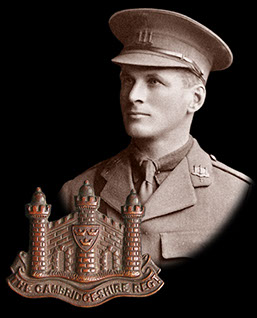
Major Harry Few, from Willingham.
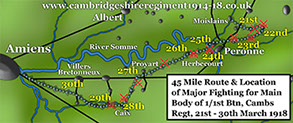
Map showing the route of the 1/1st Cambs, 21st to 30th March 1918. Please click image for a larger version.
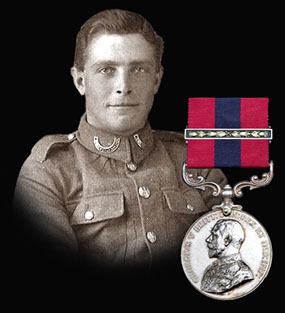
CSM Harry Betts, awarded a Bar to his DCM.
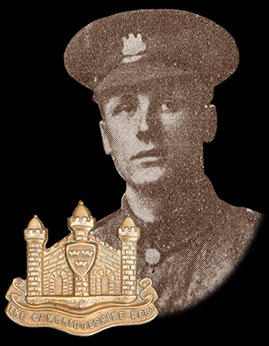
Reg Jacob, from Cambridge, one of over 140 Cambs men taken PoW during March 1918.
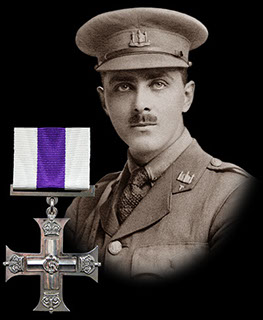
Lt Harry Driver, awarded the MC.

This site went live on the 14th February 2015 to mark 100 years since the 1/1st Cambs went off to war.
WE WILL REMEMBER THEM
Email us: cambsregt@gmail.com
Copyright 2015, 2016, 2017, 2018, 2019 by Felix Jackson. The information and images on this site should not be reproduced without prior permission.